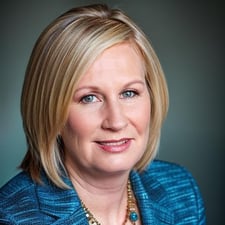When we think about professional success, it’s easy to focus on hard skills, such as degrees earned, certifications achieved, and technical expertise mastered. While those accomplishments are vital, they’re only part of the story.
The magic happens in the spaces in between.
Estimated reading time: 5 minutes
 Soft Skills, or People Skills, Are the Spaces in Between
Soft Skills, or People Skills, Are the Spaces in Between
In all of our relationships, it's often the small things that add up to building trust or breaking down trust. What many people don't realize is how powerful the little things are, the spaces in between significant experiences.
What are the spaces in between?
- How we express ourselves in conversations.
- Through our nonverbal communications throughout the day.
- How we handle tough moments.
- Pausing—or not—to self-calm and regulate.
- Shifting from judgment to curiosity.
- Inquiring about a co-worker’s weekend or family.
- The trust we build with others through showing up!
That’s where soft skills come in.
Soft skills—like empathy, effective communication, conflict resolution, curiosity with open-mindedness, and self-motivation—aren’t just helpful. They transform our personal and professional relationships, building trust and strong connections. When integrated with workforce analytics, organizations can make data-informed decisions about talent development, complementing soft skill growth with measurable workforce insights.
They’re essential tools for thriving in today’s workplaces, building strong relationships, and leading with authenticity and heart.
At their core, soft skills are about human connection:
- How well we understand ourselves and others.
- How we navigate challenges and emotions.
- How we stay open, resilient, and growth-minded, even when things get messy.
The beautiful thing about soft skills?
They're not fixed traits you're born with like temperament.
Soft skills (or sometimes referred to as people skills) are emotional intelligence EQ skills. And like any other skill, they can be learned, practiced, and strengthened over time.
Related reading: "Why Is Communication Important in the Workplace?"
Why Soft Skills Are the Real Reason for Success
Let’s dive into the five soft skills that are game-changers for success, and relationships—both personal and professional. Below are practical, simple ways to put them into action starting today.
 Empathy: The Power Skill for Connection
Empathy: The Power Skill for Connection
What it is:
Empathy is your ability to understand and genuinely feel what someone else is experiencing—even if you haven’t been in their shoes.
Why it matters:
When people feel understood, they trust you. Trust opens doors, strengthens teams, and builds lasting partnerships.
Practical uses:
- Client relations: Understanding clients’ frustrations or hopes to offer better service.
- Team dynamics: Sensing when a coworker is overwhelmed and offering support.
- Leadership: Tailoring feedback and recognition based on individual needs.
How to use it:
- Before giving feedback, ask yourself: How might they feel hearing this?
- If a coworker seems stressed, check in with a simple: “Hey, you seem overwhelmed. Is there anything I can do to help?”
- In client meetings, listen first. Don't just wait for your turn to talk.
![]() Small shift, big impact:
Small shift, big impact:
Start meetings by asking, “How’s everyone feeling about this project?” instead of jumping straight into the agenda.

 Communication: Speak (and Listen) Like a Pro
Communication: Speak (and Listen) Like a Pro
What it is:
Communication is more than just talking—it’s expressing ideas clearly and making others feel heard.
Why it matters:
Even the best ideas fail if people don’t understand them. And being a great listener builds loyalty and collaboration like nothing else.
Practical uses:
- Meetings: Clearly articulating goals, expectations, and feedback.
- Written communication: Writing emails or proposals that are precise and professional.
- Active listening: Making colleagues feel heard and valued, strengthening collaboration.
How to use it:
- When explaining something, aim for clarity over complexity.
- Practice active listening. For instance, check in and repeat what you heard to expose possible assumptions. Responding with “Just to make sure I understand...” avoids many misunderstandings.
- Match your tone to your message—enthusiasm when rallying a team, focused attention with a dose of empathy when solving a tense issue.
![]() Pro tip:
Pro tip:
Assume good intent. If an email sounds off, pick up the phone instead of letting assumptions snowball.
Related reading: "Consequences of a Lack of Communication in the Workplace."
 Conflict Resolution: Turning Disagreements Into Progress
Conflict Resolution: Turning Disagreements Into Progress
What it is:
Conflict resolution is about addressing tensions directly and respectfully to find common ground instead of letting issues fester.
Why it matters:
Unresolved tensions limit team morale and slows progress. Healthy conflict handled well sparks creativity and stronger solutions.
Practical uses:
- Mediating disagreements: Helping two coworkers find common ground instead of taking sides.
- Negotiating solutions: Balancing competing interests to reach a win-win outcome.
- Personal growth: Learning from conflicts instead of becoming defensive.
How to use it:
- Focus on the problem, not the person. (“How can we make this work?” vs. “You’re wrong.” Or “I disagree.”)
- Listen fully before responding—most people just want to feel heard.
- Suggest a next step that acknowledges both sides.
![]() Quick mindset shift:
Quick mindset shift:
Conflict isn’t bad—it’s a natural part of life and collaboration. Lean in, don’t avoid conflict.

 Curiosity & Open-Mindedness: Your Secret Growth Engines
Curiosity & Open-Mindedness: Your Secret Growth Engines
What it is:
Curiosity is your drive to learn and understand. Open-mindedness is your willingness to hear new ideas without shutting them down.
Why it matters:
In a fast-changing world, the most successful professionals aren’t the ones who “know it all”—they’re the ones who are always learning.
Practical uses:
- Professional development: Actively seeking new skills and knowledge.
- Diverse teams: Appreciating and integrating different viewpoints for stronger results.
- Innovation: Challenging assumptions and asking “What if we tried it this way?”
How to use it:
- Ask, “Why?” and “What if?” more often in meetings and brainstorms.
- Seek feedback—even (and especially) when it's uncomfortable. Discomfort is stretching you out of your comfort zone!
- Explore ideas that challenge your assumptions instead of defending your current views.
![]() Daily practice:
Daily practice:
Ask a colleague from a different department: “What’s something you wish others understood better about your work?”
Related reading: "Why Soft Skills Are Needed in Every Workplace."
 Self-Motivation: Owning Your Success
Self-Motivation: Owning Your Success
What it is:
Self-motivation means being driven from within, staying focused and committed without needing a boss to check in constantly. When we are internally motivated, our value of excellence and passion fuels our productivity.
Why it matters:
In remote, hybrid, or fast-paced environments, self-starters are gold. Leaders notice and reward those who show up consistently and push through obstacles.
Practical uses:
- Taking initiative: Volunteering for projects without waiting to be asked.
- Goal achievement: Setting personal benchmarks and exceeding expectations.
- Resilience: Staying focused and positive through setbacks and challenges.
How to use it:
- Set personal goals beyond your job description—and track your progress.
- Break big projects into small wins to stay energized.
- Acknowledge and celebrate your professional milestones instead of waiting for external praise.
![]() Energy boost trick:
Energy boost trick:
Start each day by listing 1-2 things you're excited to tackle—not just what you “have” to do.
Related reading: “Eliminate Procrastination Habits: Learn the 7 Types to Be More Effective.”
The Bottom Line
Sure! Technical skills might get your foot in the door. But soft skills?
They’ll keep you thriving at a job you love—and open new doors you didn’t even know existed.
The best part: you don’t have to master them overnight. Pick one skill from this list to practice intentionally this week. Small, consistent shifts add up to major growth.
These skills arm with practical tips to develop the people skills you need. Now, the rest is up to you!
Related reading: “Eliminate Procrastination Habits: Learn the 7 Types to Be More Effective.”
Visit Heartmanity for Business to learn more about our services. If you'd like to hire Jennifer for executive coaching or leadership training, contact us!








